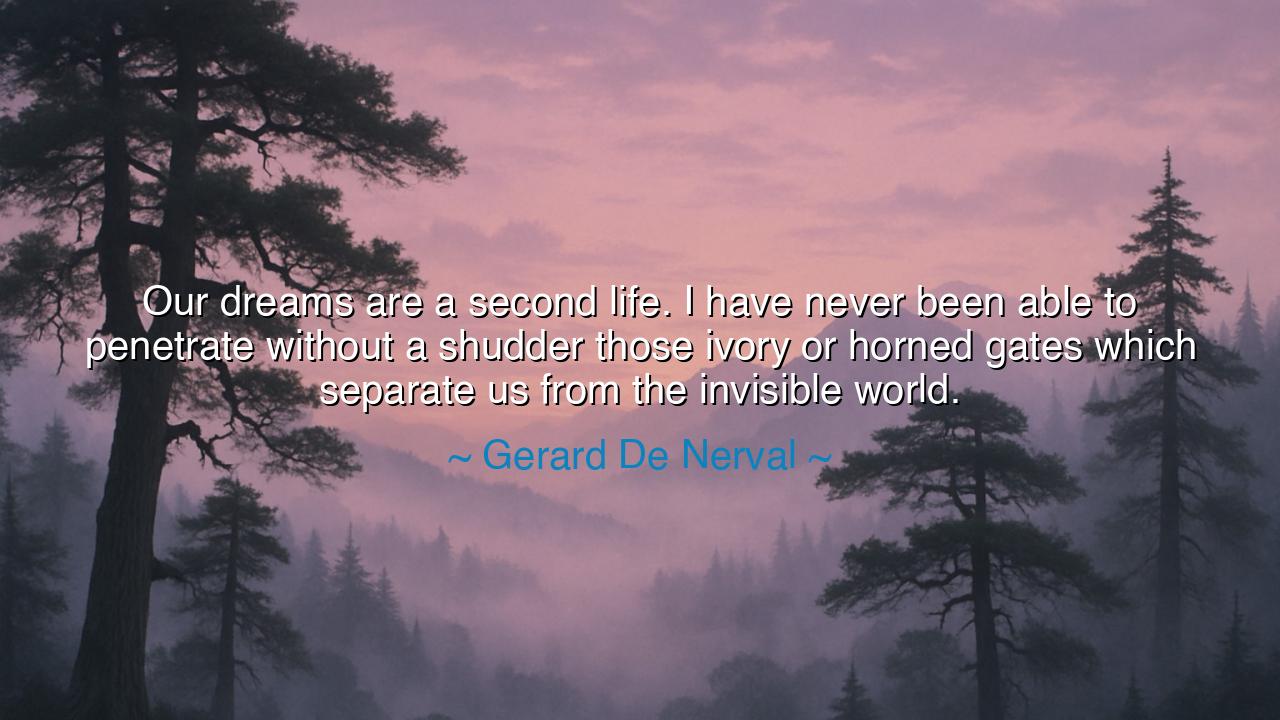
Our dreams are a second life. I have never been able to penetrate
Our dreams are a second life. I have never been able to penetrate without a shudder those ivory or horned gates which separate us from the invisible world.






In the twilight between waking and sleep, where shadows breathe and the soul drifts from the body, the poet Gérard de Nerval once wrote, “Our dreams are a second life. I have never been able to penetrate without a shudder those ivory or horned gates which separate us from the invisible world.” These words, drawn from the trembling edge of consciousness, reveal a truth as old as humanity itself — that dreams are not mere illusions of the night, but windows into the vast and mysterious invisible world where the spirit wanders free.
Nerval, a visionary of the 19th century, walked often along the borders of reason and madness. To him, dreams were not fragments of the mind’s confusion, but messengers from a deeper reality — a realm where time dissolves and the dead still speak. When he speaks of the “ivory or horned gates,” he echoes the ancients of Greece and Rome, who believed that dreams passed through two portals: the Gate of Horn, through which came true visions, and the Gate of Ivory, through which came false and deceptive dreams. Nerval confesses that he could not cross those gates without a shudder, for he sensed that behind them lay truths too vast and too terrible for mortal understanding — the realm of souls, symbols, and memory beyond death.
For the ancients, and for Nerval after them, sleep was a sacred voyage — a nightly death, a descent into mystery. The Egyptians believed the soul left the body to commune with the gods. The Greeks listened to their dreams as messages from Olympus. And even in our age of science, when the mind is dissected into neurons and chemicals, the dream still resists mastery. It remains, as Nerval says, our second life — a realm where the mind reveals its hidden architecture, and where the heart whispers what it cannot say by daylight.
Think of Carl Jung, the great psychologist who, like Nerval, saw dreams as the mirror of the unconscious — a language of symbols through which the self speaks to itself. When Jung dreamt of floods and fire, he foresaw the great wars that would engulf his century. To him, as to Nerval, dreams were not madness but revelation. They were the invisible threads connecting man to eternity, the secret voice of the soul calling out to be known. Those who listen to their dreams, Jung taught, walk closer to the divine — for within them, one finds both the wound and the cure.
But Nerval’s tone is not one of comfort. His words carry awe and fear. To dream, he suggests, is to approach the mystery of existence itself — to stand at the edge of the abyss and glimpse what lies beyond. The “invisible world” he speaks of is the domain of truth that lies beneath appearances: the forgotten memories of the soul, the whispers of ancestors, the reflections of eternal archetypes. And he trembles before it because he knows — as mystics and prophets have always known — that to look too deeply into that world is to risk being consumed by it.
In his own life, Nerval was both blessed and cursed by vision. His dreams and waking visions merged until he could no longer tell one from the other. He walked through Paris conversing with spirits, believing he had glimpsed the secret pattern of creation — and yet, the very fire that gave him insight also burned him. His death, by his own hand, was the final crossing of those gates he feared and longed for. Thus, his words are not mere poetry, but testimony: a warning to those who seek wisdom without humility, for the invisible world is real, and it demands reverence.
And so, O listener of the ages, take from this teaching a sacred caution and a sacred gift. Do not dismiss your dreams as nonsense, nor chase them blindly into darkness. Listen to them as you would to oracles — with respect, with curiosity, and with discernment. Let them teach you of yourself, but remember that they come from a place where reason cannot rule. For the ivory and horned gates still stand before us each night, and through them, we wander into our second life. Enter them not as conqueror, but as pilgrim — with wonder, with courage, and with the humble knowledge that you are crossing, if only for a moment, into the eternal mystery of the soul.






AAdministratorAdministrator
Welcome, honored guests. Please leave a comment, we will respond soon